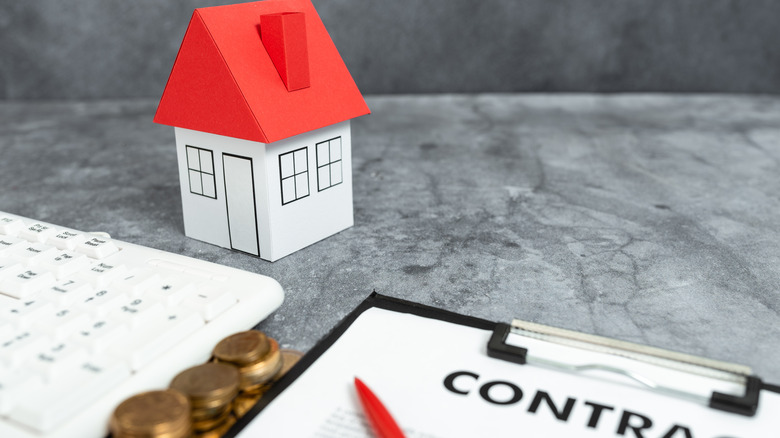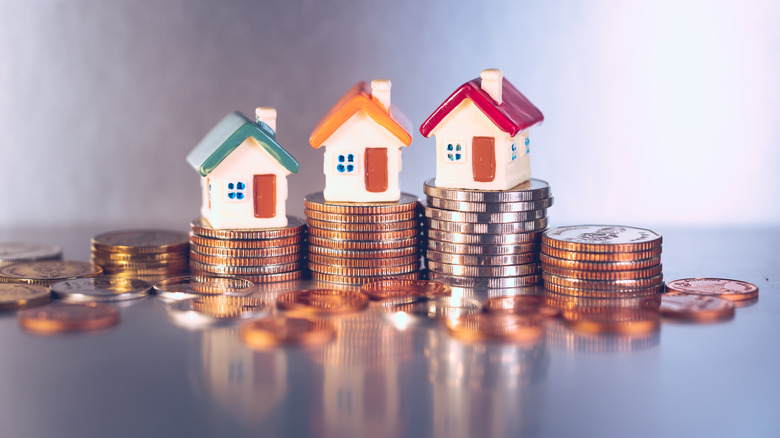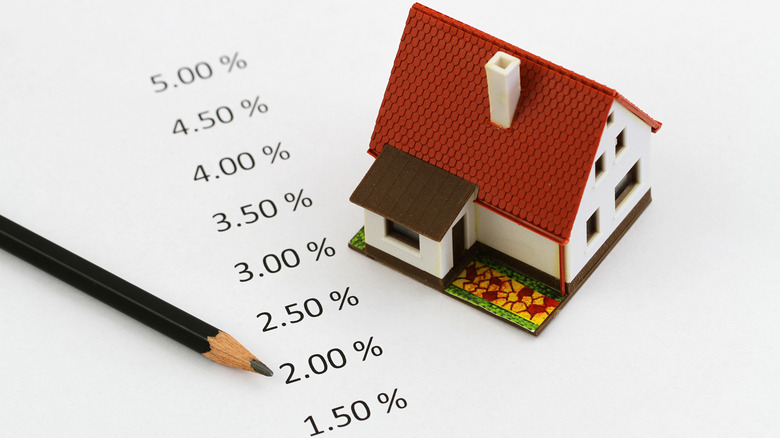What You Need To Know About A No-Closing-Cost Mortgage
Part of the American dream is to be able to own a nice home for your family. However, for most people, unfortunately, owning a house stays just a dream because of the huge financial implications of buying property. Let's face it; nice homes in the U.S. can be quite expensive, and not everyone gets a chance to buy one. But all is not lost; today, there are plenty of ways of mitigating the financial burden that comes with the cost of a new residence.
One option that is guaranteed to help with the initial financial obligations that come with buying a new house is the no-closing-cost mortgage. A no-closing-cost mortgage is where your lender takes up all the closing costs and charges in the form of higher interest rates (via NextAdvisor). While this can be a great way of removing the burden that comes with the closing cost, you should be aware that it will be expensive down the line. So what should you know about this approach? Read on to find out.
What is a no-closing-cost mortgage?
A mortgage is never free; other expenditure implications always come with it and are often referred to as closing costs. To really understand this type of mortgage, first, you need to be aware of what a closing cost is. During the process of buying a property, different third-party entities like the real estate attorneys and your lender, just to mention a few, will offer different services. Now, a closing cost is the combined "labor cost" for the services performed throughout the period of purchasing your home.
How much you have to pay for your closing cost depends on different factors and can be quite a significant amount depending on your unique situation. According to Quicken Loans, these expenses typically range from 3% to 6% of the property's purchasing price. A no-closing-cost mortgage will take care of these fees since the lender will pay upfront and later recover the money in the form of interest.
What does the closing cost loan recovery process look like?
By now, you are aware that despite not paying for the closing cost, you will still have to repay the amount one way or the other. However, don't get it wrong — any stretch will not blindside you since the government requires the lending company to give you an estimate of the closing expenses before closing on your mortgage. Therefore, there are two ways a lender can cover these costs.
Depending on the amount of loan requested, your lender might allow you to borrow the extra 3% to 6% for the closing cost. Another option is that your lender may take up the closing cost and increase your interest rate, let's say from 4% per month, Bankrate explains. Regardless of the option you decide to take, one thing for sure is that you will eventually pay for the conveniences your lender extended your way.
Pros and cons of a no-closing-cost mortgage
Every loan you take comes with its fair share of advantages and disadvantages; a no-closing-cost mortgage is no different. One immediate advantage that you stand to benefit from this type of loan is that you get to keep some money in your pocket. This is a great benefit since taking money from your savings to finance an unexpected bill might leave you stranded, especially in the event of an emergency. Another possible advantage is the convenience of not paying the lumpsum upfront; rather, the amount is divided into smaller monthly mortgage payments over the loan repayment period.
On the flip slide, however, Rocket Mortgage notes that a no-closing-cost mortgage means a less attractive loan in the way of bigger interest that otherwise you would not be willing to take up. For example, an increase in interest from 3.5% to 4% might look insignificant on paper, but when compounded over a period of around 30 years, it accumulates significantly.
Alternatives to a no-closing-cost mortgage
It goes without saying that buying a home is expensive, and you cannot avoid the closing costs. However, the most direct approach to reducing these expenses is through negotiation. First, make sure you are aware of all the closing cost fees. From here, you can negotiate with your lender for possible waivers on some of the service fees. Make sure you also have a sit down with other parties involved in the property buying process, like the real estate attorney, and negotiate on the service fees as well.
Another party you are likely to strike a better deal with is the property seller through a seller concession. Ask them to offset the closing cost on your behalf for a better purchasing price for the property. According to Rocket HQ, a seller concession lifts the closing cost burden, but even more importantly, the amount is added to the purchasing price and not paid back in the way of higher interest rates.
Is a no-closing-cost mortgage right for you?
Well, there is no right or wrong answer to this question because of the different individual circumstances that property buyers have at the time. While not everyone will benefit from a no-closing-cost mortgage, it is a good option for anyone who doesn't have the intention of staying in that house for a long time. On the other hand, if you intend to live in that home for a short while, then you won't stay long enough to experience the benefits of a regular mortgage.
Also, a no-closing-cost mortgage is a burden off the shoulder of the individuals who genuinely cannot raise funds to pay the costs upfront. That being said, a no-closing-cost mortgage is generally an arrangement where the home buyer gets the shorter end of the stick in the long run. Investopedia advises you to ask the right questions, do your due diligence, and run the numbers to see if it makes financial sense to you before plunging ahead.





